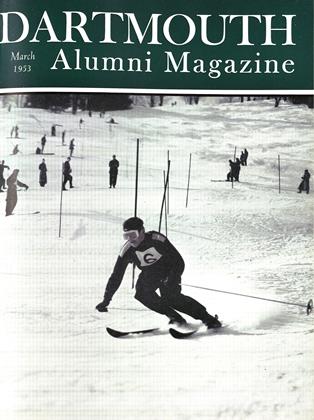THE HOUSE COMMITTEE ON UNAMERICAN ACTIVITIES, 1945-1950. ByRobert K. Carr '29. Ithaca: Cornell University Press. 1952. 489 pp. $4.50.
This is not only an important book. It is a fascinating account of one of the most spectacular committees ever established by Congress, and a thoughtful though critical analysis of its assets and liabilities. On balance, in Professor Carr's words, "the good things the Un-American Activities Committee has done are outweighed by the bad."
The volume, one of the Cornell Studies in Civil Liberty, is the first full length presentation of the record of the House investigation of subversive activities. It is from any point of view an astonishing record. Preceded by the Dies Committee (1938-1944), the Committee on Un-American Activities was established in 1945 as a standing committee by a parliamentary trick engineered by John Rankin; it drew to its membership some "of the most incompetent and thoughtless members of Congress" and gave them opportunity "to obtain almost unlimited publicity for their irresponsible acts." Mr. Carr might have expended even more indignation on the irresponsibility of the leaders of both political parties in Congress in failing to define the job of the Committee more precisely, and in refusing to curb its excesses.
Professor Carr gives the committee credit for informing Americans about the true character and purposes of international communism; for exposing the objects and methods of American Communists; for revealing the espionage activities of Communist agents in the United States; and for the passage of the Internal Security Act of 1950. He condemns the committee for its attacks on individuals, for encouraging a widespread witch-hunting spirit, for lowering the morale of the federal service, for confusing clear thinking about communism, for creating apprehension about the state of society, and, not least, for discrediting Congress.
Besides being an important work on an important subject, it is a well-written book clean craftsmanship throughout and with many gems of characterization. Chairman J. Parnell Thomas is finished off in three words: "noisy, arrogant, and opinionated"; Rankin: "It is difficult to know whether to dismiss Rankin as a cruel but meaningless joke... or to take him seriously"; Stripling: "great ability as an investigator and inquisitor ... a dedicated and fanatical man." The accounts of the Hiss case, the Remington case, the Condon case, the Duggan case, and others that occupy the central portion of the work are exceptionally well done.
This is also a courageous book on a very controversial subject. Mr. Carr has not shied away from forthright language in condemning both procedures and persons involved in a committee enterprise bounded only by the vague limits of "un-American activities" and perverted by the thirst for publicity on the part of some, of the principal actors. That Congress has a right and duty to investigate is beyond question, and that the duty has been frequently well discharged is also beyond doubt. How to conserve the public values that are inherent in this aspect of congressional responsibilities and curb the danger of abuse is not an easy problem to solve. Mr. Carr urges Congress at least to attempt a solution.
 View Full Issue
View Full Issue
More From This Issue
-
 Class Notes
Class Notes1929
March 1953 By F. WILLIAM ANDRES, EDWIN C. CHINLUND -
 Class Notes
Class Notes1918
March 1953 By ERNEST H. EARLEY, DONALD L. BARR -
 Article
ArticleEducation for What?
March 1953 By CHARLES LEONARD STONE '17 -
 Article
ArticleThe Responsibility of Management
March 1953 By CLARENCE B. RANDALL -
 Article
ArticleHome Thoughts On Europe
March 1953 By FRANCIS R. DRURY JR. 48 -
 Class Notes
Class Notes1920
March 1953 By RICHARD M. PEARSON, ROSCOE O. ELLIOTT
Leonard D. White '14
Books
-
 Books
BooksTHE STORY OF WRITING: FROM CAVE ART TO COMPUTER.
MARCH 1963 By ADELAIDE B. LOCKHART -
 Books
BooksPOLLUTION, PROFITS & PROGRESS.
JANUARY 1972 By CHARLES KERSHNER -
 Books
BooksLET ME SHOW YOU VERMONT.
June 1937 By F. L. Childs '06 -
 Books
BooksFRANCE ON $50
May 1933 By H. G. R. -
 Books
BooksSOFT MONEY
October 1939 By H. M. Dargan -
 Books
BooksCITIES IN THE WILDERNESS: THE FIRST CENTURY OF URBAN LIFE IN AMERICA
March 1939 By Wayne E. Stevens.



